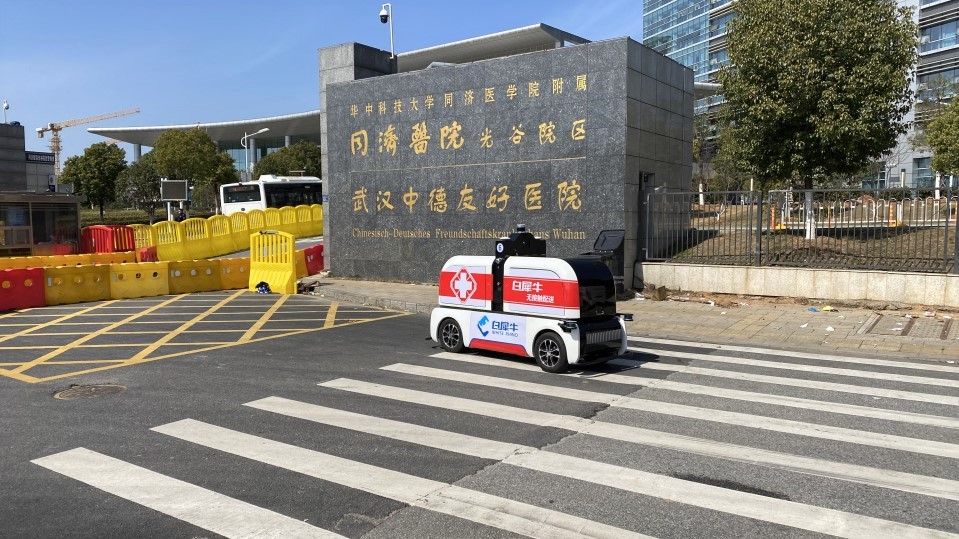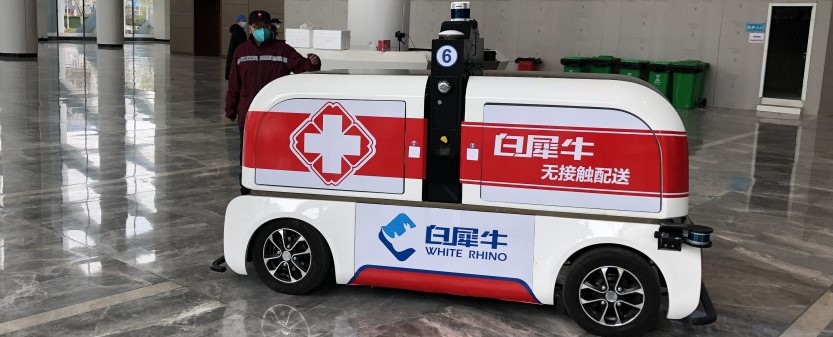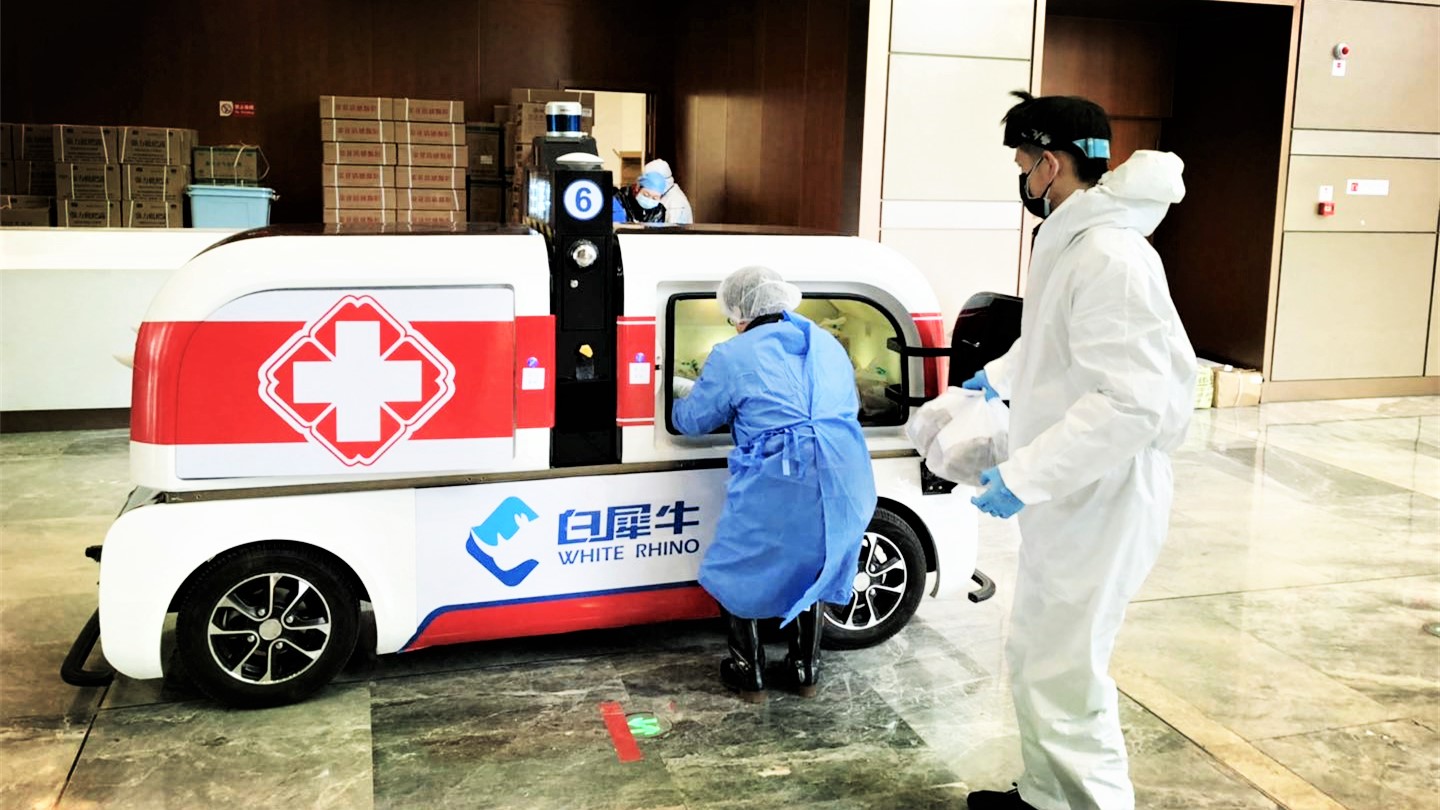

In China, robot delivery vehicles deployed to help with COVID-19 emergency
01 April 2020 Charles Arthur and Ruan Shuhui

Unmanned vehicles or carts that can carry food or other items are nothing new, not in China at any rate. The JD.com e-commerce company began road-testing the country’s first domestically developed self-driving delivery vehicle in September 2016, and a number of other companies quickly joined in a race to seize the market.
However, since then, the high cost of the unmanned vehicles, technological bottlenecks, legal restrictions and China's complex traffic systems have all served to restrict large-scale operations to areas such as schools, gated communities, parks and hotels.
With the outbreak of the coronavirus in Wuhan in Hubei province in December 2019, a new role for the unmanned delivery vehicles soon emerged. Thanks to a partnership between UNIDO’s Investment and Technology Promotion Office (ITPO) in Shanghai, and the Beijing-based White Rhino Auto company, unmanned vehicles were set to work at Wuhan’s Guanggu Field Hospital.
Two White Rhino vehicles were brought to Wuhan from Beijing by the company CEO and two engineers who set them up to transport medical supplies, deliver meals for doctors and patients, and complete other emergency tasks in the hospital. The use of the unmanned vehicles not only helped avoid cross-infection but also reduced the workload of the hard-pressed medical staff.


However the deployment of the vehicles was not easily achieved because, in the early stage of the coronavirus outbreak in Wuhan, the city was placed under a complete lock-down and only essential personnel and medical supplies were allowed in. At that time, unmanned distribution vehicles were not classified as anti-epidemic material, and it was impossible to transport them to Wuhan or get the engineers into the city.
Fortunately, White Rhino Auto was already in touch with ITPO Shanghai having contacted the office in 2019 to explore its business expansion and new investment plans in the Yangtze River Delta Region of China. Once ITPO Shanghai was informed that the company was offering to provide unmanned distribution vehicles, it used its well-established public-private cooperation network to contact the city authorities. Together with Haidian district government in Beijing, ITPO Shanghai arranged the necessary permission and permits for White Rhino Auto’s unmanned vehicles to be delivered to Wuhan’s Guanggu Field Hospital on 17 February.
The White Rhino Auto company was only founded in 2019 but has developed fast. Its unmanned distribution vehicles - one metre wide, two and a half metres long and with a top speed of 25kph - are already operating in the Zhongguancun area of Haidian district in northwestern Beijing where the company is headquartered. The vehicles make use of advanced digital production (ADP) technologies in the form of AI algorithms to upgrade software engineering and laser radar to enhance connectivity.
Zhu Lei, CEO of White Rhino Auto, said, “We are very grateful for UNIDO ITPO Shanghai’s help. In this global fight against the epidemic, they (the office staff) actively integrate social resources and the convening efforts of all parties, which shows us the important role of international organizations in establishing a public-private cooperation network in the middle of crisis management.”
With Chinese companies keen to share solutions and provide technical assistance, Zhu expressed his company’s willingness to meet global needs and participate in the collective battle against COVID-19.
UNIDO’s ITPO Shanghai is committed to building public-private partnerships in the field of ADP technologies. It works with Chinese enterprises in the process of digital transformation to further improve their agility in responding to changes, and to enhance their capacity to integrate into the global supply chain. It also promotes joint efforts among public and private sectors to effectively leverage the potential of ADP technologies to lift people’s standard of living.
Another ITPO Shanghai partner that is also providing AI solutions for fighting the coronavirus pandemic is the CloudMinds tech company. In early March, CloudMinds worked with Wuhan Wunchang Hospital and China Mobile to open a field hospital staffed by robots. Dubbed the 'Smart Field Hospital', the facility, located in Wuhan's Hongshan Sports Centre, is a trial to gauge the effectiveness of using robots to relieve exhausted health care workers.
Video: CloudMinds
At the Smart Field Hospital medical services were performed by robots and other devices making use of the Internet of Things. Patients at the facility wore smart bracelets and rings that synced with CloudMinds’ AI platform so their temperature, heart rate and blood oxygen levels could be monitored. Other robots provided patients with food, drinks, medicine and information, while others sprayed disinfectant and cleaned floors.
Zhao Xiaolei, Head of ITPO Shanghai, said, “Through these successful cases of high-tech companies fighting against the epidemic, we have seen the advantage of applying ADP technologies to effectively solve the pain points in containing the virus. ITPO Shanghai will continue to provide these enterprises and local governments seeking industrial upgrading with advisory services on investment match-making and technology cooperation.”